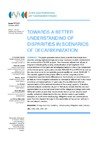This paper presents results from a model intercomparison exercise among regionalized global energy-economy models conducted in the context of the RECIPE project. The economic adjustment effects of longterm climate policy aiming at stabilization of atmospheric CO2 concentrations at 450 ppm are investigated based on the cross-comparison of the intertemporal optimization models REMIND-R and WITCH as well as the recursive dynamic computable general equilibrium model IMACLIM-R. The models applied in the project differ in several respects and the comparison exercise tracks differences in the business as usual forecasts as well as in the mitigation scenarios to conceptual differences in the model structures and assumptions. In particular, the models have different representation of the sectoral structure of the energy system. A detailed sectoral analysis conducted as part of this study reveals that the sectoral representation is a crucial determinant of the mitigation strategy and costs. While all models project that the electricity sector can be decarbonized readily, emissions abatement in the nonelectric sectors, particularly transport, is much more challenging. Mitigation costs and carbon prices were found to depend strongly on the availability of low-carbon options in the nonelectric sectors.
- issn: Q54, Q55, Q43, L90
CMCC Divisions
Authors
- Keywords: Climate Policy, Energy-economy modelling, Industry, Mitigation costs


